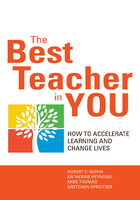
Teacher Development
The two perspectives also have implications for how to help teachers improve. From a directive perspective, teacher development is more likely to focus on honing skills related to planning, classroom management, and pedagogy. This perspective assumes that particular practices reliably produce particular outcomes. Professional development in this perspective relies on experts to provide teachers with scientifically validated solutions to predictable pedagogic problems. All of this is true, but it is also partial by itself.
In the co-creative perspective, a classroom becomes an adaptive organization. It consists of people in relationships with one another. Each student is an interdependent actor with the potential to learn, teach, and know. Learning accelerates and is deepened when a teacher forms high-quality relationships with students. Learning accelerates further when students form high-quality relationships with one another. To achieve this level of relationship, the teacher continually clarifies purpose, increases authenticity, practices empathy, and opens to the co-creative journey.
Teacher development, in the co-creative perspective, is likely to focus on reflection, self-assessment, interaction, experimentation, and learning from experience. Teachers engage in activities that challenge them and invite them to examine their own assumptions and beliefs. They are encouraged to empower themselves to explore, appreciate, and integrate alternative assumptions. These experiences enable them to think and act in more complex ways. As they build these capacities, they better understand how to empower students and accelerate learning. Here a teaching practice is not so much a solution to a problem as an opportunity for experimentation, engagement, and learning.
Teachers engage in activities that challenge them and invite them to examine their own assumptions and beliefs. They are encouraged to empower themselves to explore, appreciate, and integrate alternative assumptions. These experiences enable them to think and act in more complex ways. As they build these capacities, they better understand how to empower students and accelerate learning. Here a teaching practice is not so much a solution to a problem as an opportunity for experimentation, engagement, and learning.
In the co-creative perspective, development is not teaching teachers to know; it is teaching teachers to learn. As a teacher develops the capacity to think and act in more complex ways, his or her effectiveness increases because effectiveness is a function of being in the present and learning to adapt and create in real time. The objective is for the teacher to acquire adaptive confidence and transformational influence.